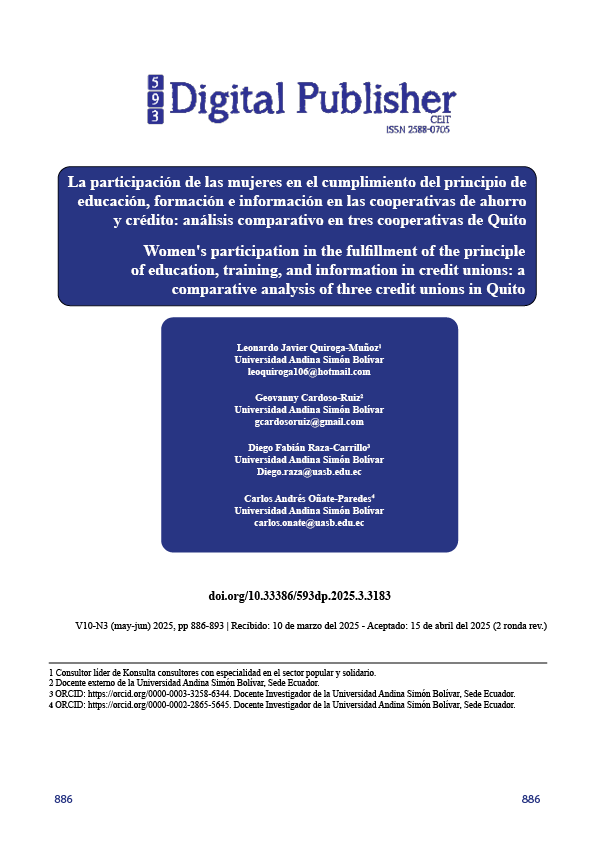Women's participation in the fulfillment of the principle of education, training, and information in credit unions: a comparative analysis of three credit unions in Quito
Main Article Content
Abstract
This research aims to analyze the perception of women engaged in retail activities regarding the impact of access to microcredit on their quality of life and empowerment. A qualitative study was conducted through in-depth interviews with 20 women beneficiaries of microcredit in the city of Loja, Ecuador. The interviews addressed various dimensions, such as demographic aspects, microcredit usage, empowerment, and quality of life. The results reveal that women perceive microcredit positively, considering it a key factor in improving both their quality of life and that of their dependents. This improvement is mainly reflected in the enhancement of their businesses through the acquisition of furniture, inventory, and increased income. The rise in income has provided greater flexibility to meet the basic needs of their families, such as food, education, health, and clothing, especially in cases where women are heads of household. At the level of empowerment, beneficiaries perceive a positive impact, as microcredit programs have influenced their emotional well-being, economic and financial independence, as well as their self-confidence and self-esteem. The effect of microcredit is greater among young women, with higher education levels, who use the credit for investment and possess financial management knowledge. Additionally, it was observed that the benefits derived from microcredit tend to manifest in the medium and long term. These findings highlight the importance of providing access to microfinance and including financial education and training to ensure the success and sustainability of women-led retail businesses.
Downloads
Article Details

This work is licensed under a Creative Commons Attribution-NonCommercial-ShareAlike 4.0 International License.
1. Derechos de autor
Las obras que se publican en 593 Digital Publisher CEIT están sujetas a los siguientes términos:
1.1. 593 Digital Publisher CEIT, conserva los derechos patrimoniales (copyright) de las obras publicadas, favorece y permite la reutilización de las mismas bajo la licencia Licencia Creative Commons 4.0 de Reconocimiento-NoComercial-CompartirIgual 4.0, por lo cual se pueden copiar, usar, difundir, transmitir y exponer públicamente, siempre que:
1.1.a. Se cite la autoría y fuente original de su publicación (revista, editorial, URL).
1.1.b. No se usen para fines comerciales u onerosos.
1.1.c. Se mencione la existencia y especificaciones de esta licencia de uso.
References
ACI. 2015a. “Notas de orientación para los principios cooperativos”. https://www.ica.coop/sites/default/files/2021-11/Guidance%20Notes%20ES.pdf.
Coraggio. 2020. “Economía social y economía popular: Conceptos básicos. Ministerio de Desarrollo Productivo Argentina”. AR Ministerio de Desarrollo Productivo Argentina. https://www.coraggioeconomia.org/jlc/archivos%20para%20descargar/Economia%20Social%20y%20Economia%20Popular%20-%20Conceptos%20Basicos.pdf.
Coraggio, José Luis. 2011. Economía Social y Solidaria: El trabajo antes que el capital. Quito: Abya Yala. https://www.coraggioeconomia.org/jlc/archivos%20para%20descargar/economiasocial.pdf.
EC. 2023. Ley Orgánica de Economía Popular y Solidaria y del Sector Financiero Popular y Solidario (LOEPS). Registro Oficial 311, Suplemento, 16 de mayo de 2023. https://www.seps.gob.ec/wp-content/uploads/LOEPS.pdf.
Gadea Soler, Enrique. 2011. “La función económica de la cooperativa y la necesidad de una legislación adecuada”. Boletín de la Asociación Internacional de Derecho Cooperativo, no 45, 285–99.
Jubeto Ruiz, Yolanda, Luis Guridi Aldanondo, y Maite Fernández-Villa. 2014. Diálogos sobre economía social y solidaria en Ecuador: encuentros y desencuentros con las propuestas para otra economía. Bilbao: Universidad del País Vasco. https://dhls.hegoa.ehu.eus/uploads/resources/5464/resource_files/Dialogos_sobre_ESS_en_Ecuador.pdf.
Quiroga, Leonardo. 2024. Cumplimiento de los principios universales de educación, formación e información, cooperación entre cooperativas y control democrático por parte de los miembros en las cooperativas de ahorro y crédito del segmento 1 del cantón Quito
Rodríguez Soto, Julián Ricardo, y Jairo Hernández Sánchez. 2019. “Los principios cooperativos desde el dilema ético y el grado de aplicabilidad”. Aletheia: Revista de Desarrollo Humano, Educativo y Social Contemporáneo 11 (1): 107–24.
Zura, Marco, Patricio Villa, y Luis Andrés Crespo Berti. 2020. “El holograma del Sumak Kawsay, principio, valor o regla: Cooperativismo al buen vivir en el sistema constitucional ecuatoriano”. Revista Dilemas contemporáneos: Educación, Política y Valores, no Edición Especial (febrero), 13. https://doi.org/10.46377/dilemas.v33i1.2123.





